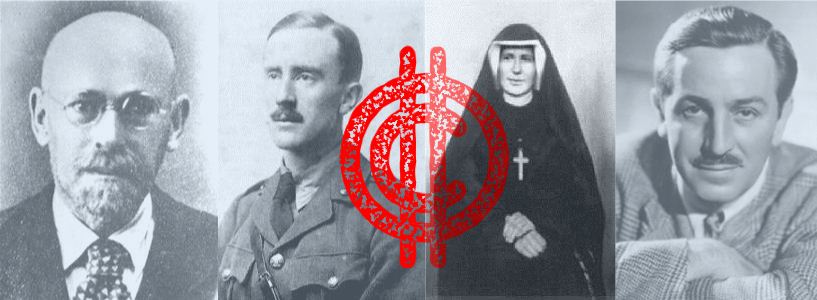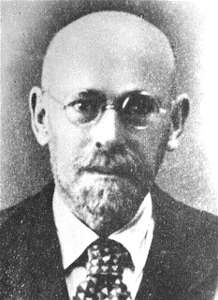
Giger died, but his works are still copyrighted. I’ve decided to write about some cruelties caused by long expiration of copyrights, using cases Tolkien, Korczak, st. Faustine and Disney.
Did you know that we could use H.R. Giger’s works at 1st January 2085? If law won’t change, but it has changed and it could change again. The law, which is applicable in many regions and countries including USA, United Kingdom and European Union, says that work becomes public domain in the 1st January of next year after 70 years. H.R. Giger died at 12th May 2014, plus 70 years is 2084 and 1st January of next year is in 2085. So if we can’t use it, why there’s so much his works in the Internet? People use it, of course, but they could be sued and then fined. If you want to release album with cover art using Giger’s work without permission, you’ll be probably fined – it’s the right of his heirs. Seems fine – it’s his work, so you can’t use it. The copyright cash for 70 years is said to be help for heirs. But it’s not always for the family and when time after death is passing by, it’s becomes more likely it’s no more owned by family. It’s often a publisher. Even if it would be only for family, then 70 years is a bit long.
If you think that’s still fine, let me show you four cases – of J.R.R. Tolkien, Janusz Korczak, saint Faustina and Disney.
The case of Janusz Korczak
Knowledge that would make world better
 Janusz Korczak, as Wikipedia says, was a “Polish-Jewish educator, children’s author, and pediatrician“. He died in 1942, so copyrights should expire in 2013. But it didn’t. His heir is a company – publisher. He’s worth a lot of cash. Yeah, it’s not about his teachings, his books, but he’s just a bunch of money for the publisher. Let me just say a bit about that interesting person, who still inspires a lot of parents and pedagogues. He was leading his orphanage, writing books for children and about children. He hadn’t had biological kids, because he sacrificed his live to his kids – orphans. During Second World War he had his life choice – leave his kids alone or go with them. He knew where he’s going and he choosed that way – to the gas chamber in Nazi camp. But it wasn’t only that touching history, which made him famous and cause why young teachers and educators are learning about his ideas. One of his ideas was to treat kids like an adults, i.e. when kid says an opinion it should be considered, not taken as “just a kid’s words”. He was teaching it 100 years ago and as you see it’s still very modern idea. That’s why he’s worth a lot of cash.
Janusz Korczak, as Wikipedia says, was a “Polish-Jewish educator, children’s author, and pediatrician“. He died in 1942, so copyrights should expire in 2013. But it didn’t. His heir is a company – publisher. He’s worth a lot of cash. Yeah, it’s not about his teachings, his books, but he’s just a bunch of money for the publisher. Let me just say a bit about that interesting person, who still inspires a lot of parents and pedagogues. He was leading his orphanage, writing books for children and about children. He hadn’t had biological kids, because he sacrificed his live to his kids – orphans. During Second World War he had his life choice – leave his kids alone or go with them. He knew where he’s going and he choosed that way – to the gas chamber in Nazi camp. But it wasn’t only that touching history, which made him famous and cause why young teachers and educators are learning about his ideas. One of his ideas was to treat kids like an adults, i.e. when kid says an opinion it should be considered, not taken as “just a kid’s words”. He was teaching it 100 years ago and as you see it’s still very modern idea. That’s why he’s worth a lot of cash.
After Second World War Polish courts had to set official date of death for a lot of persons. It was like a batch, so nobody would care about giving a good date. His death’s date was set to 9th May 1946 and that means that copyrights will expire in 2017. Did anybody tried to to something about that? Yeah, but publisher fought bravely in a few lawsuits and they still earn cash from his knowledge. They promised that they will publish his works and you could download it for free. For some people it was like winning that game. Sadly it’s still bad, because reading his works is as important as reusing them. If you would like to share his ideas in your book, like choose the best ones, write comments – you can’t! It’s copyrighted, you have to pay publisher.
It annoys me that the publisher wants cash and with it he makes Korczak’s ideas less available, less popular. Korczak got his knowledge by practise, and he shared it to help others – after his death it didn’t help orphans in material way – it helped the publisher. It’s hard to describe how I feel about it, but the world shouldn’t be like that.
The case of saint Faustina
Copyrights for 113 years after death

Saint Faustina (Mary Faustina Kowalska) was a Polish nun. She was mystic and visionary. She was writing a diary which contained her visions. It’s an important document for Catholics. She was writing it until her death in… 1938. It was published as “Diary: Divine Mercy in My Soul”. Again – it should be public domain in 2009 year. So why it isn’t? Her order – Congregation of the Sisters of Our Lady of Mercy – says that they have copyrights for his works. Generally they say that she worked for them, so copyright holder is her order and they will keep until 2051. And again – you can download it, but you can’t reuse it.
Some lawyers (like Piotr Waglewski) says that words of order are dubious, but the point is that publisher is the person who’s getting cash and together with it our knowledge is lesser.
The case of J.R.R. Tolkien
We we won’t see Silmarillion movie
 John Ronald Reuel Tolkien, author of books like The Lord of the Rings, The Hobbit, Silmarillion and many more. He died in 1973 and in this case his copyrights are held by Tolkien Estate – legal body which is in part owned by J.R.R. Tolkien’s family. J.R.R. Tolkien sold his rights to make a movie based on his released books. He knew what he’s doing and because this action we can watch Tolkien’s book adaptations, notably Peter Jackson’s The Lord of the Rings and The Hobbit.
John Ronald Reuel Tolkien, author of books like The Lord of the Rings, The Hobbit, Silmarillion and many more. He died in 1973 and in this case his copyrights are held by Tolkien Estate – legal body which is in part owned by J.R.R. Tolkien’s family. J.R.R. Tolkien sold his rights to make a movie based on his released books. He knew what he’s doing and because this action we can watch Tolkien’s book adaptations, notably Peter Jackson’s The Lord of the Rings and The Hobbit.
The first problem is that his son – Christopher Tolkien – don’t like these movies. Well, it’s his moral right. The second problem is that Silmarillion wasn’t released before death of his father and that way rights to make a movie wasn’t sold. People are writing letters to Jackson, but he just can’t do anything except asking Christopher. Christopher is sure that he don’t want another movie made by Jackson or maybe even any movie.
This time family is a problem. They are getting a cash from books of John Ronald Reuel Tolkien, but the law doesn’t say that they have to sell copyrights. Tolkien Estate have their choice and their choice was to forbid people watching Jackson’s movies. Maybe J.R.R. wouldn’t like these movies as well, but we don’t know it. And even if he wouldn’t like them maybe he wouldn’t have anything against making it. Now it doesn’t matter, it’s not longer a decision of an author – now it’s a decision of somebody other. This would be called “a protection of his books“, but it’s a protection of thinking that the heir’s taste is anyone’s taste.
The case of Disney and Mickey Mouse
If you don’t like the law and you got money, you can change it
 Disney lobbied for Copyright Term Extension Act known also as “Mickey Mouse Protection Act”. Some similair acts was set in motion in other parts of the world. They wanted to extend copyright term, because Mickey Mouse would become public domain. They had a reason to fight and they won. They could abaddon using Mickey for merchandising, using it as their mascott or… Change the law wherever you can! And they did it. They really did it. In this case maybe Walt Disney would be proud, but what about us, the people? Can we change the law if it’s bad for us? Not really. Do we suffer from that law change? Yes – we have less free (open) artwork and knowledge to choose from.
Disney lobbied for Copyright Term Extension Act known also as “Mickey Mouse Protection Act”. Some similair acts was set in motion in other parts of the world. They wanted to extend copyright term, because Mickey Mouse would become public domain. They had a reason to fight and they won. They could abaddon using Mickey for merchandising, using it as their mascott or… Change the law wherever you can! And they did it. They really did it. In this case maybe Walt Disney would be proud, but what about us, the people? Can we change the law if it’s bad for us? Not really. Do we suffer from that law change? Yes – we have less free (open) artwork and knowledge to choose from.
Conclusion
I can understand copyrights for works for like 10-15 years after author’s death. But 70? Much too long and for some it’s not enough. In the first case a knowledge suffered from such long time and even with these long 70 years, publishers still find a way to get a cash. The second case was when purely religious experiences can’t be reused, because their order (and publisher) thinks it’s good to keep such things behind the “paywall”. The third case shows that family getting cash is not always as nice as it could seem to be. And fourth case… Well, the fourth case makes it clear.
It’s not about any help to family of the person who died or protection of works. It’s about taking rights of dead people who can’t decide no more. And I stand against it, because I want to see the better world with more valuable knowledge and artwork. The world where I could choose what’s good for my taste. The world without creepy fights to get deceased people’s things.
